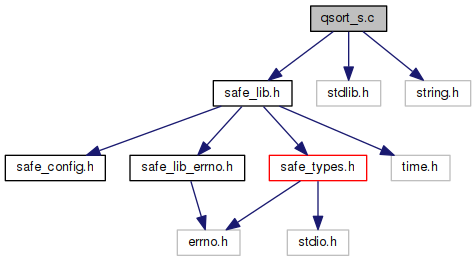 Include dependency graph for qsort_s.c:
Include dependency graph for qsort_s.c:Macros | |
| #define | ntz(x) a_ctz_l((x)) |
Typedefs | |
| typedef unsigned long | uint64_t |
| typedef int(* | cmpfun) (const void *, const void *, void *) |
The qsort_s function sorts the given array pointed to by base in ascending order. More... | |
Functions | |
| static int | a_ctz_64 (uint64_t x) |
| static int | a_ctz_l (unsigned long x) |
| static int | pntz (size_t p[2]) |
| static void | cycle (size_t width, unsigned char *ar[], int n) |
| static void | shl (size_t p[2], int n) |
| static void | shr (size_t p[2], int n) |
| static void | sift (unsigned char *head, size_t width, cmpfun cmp, int pshift, size_t lp[], void *ctx) |
| static void | trinkle (unsigned char *head, size_t width, cmpfun cmp, size_t pp[2], int pshift, int trusty, size_t lp[], void *ctx) |
| static void | qsort_musl (void *base, size_t nel, size_t width, cmpfun cmp, void *ctx) |
| EXPORT errno_t | qsort_s (void *base, rsize_t nmemb, rsize_t size, int(*compar)(const void *k, const void *y, void *context), void *context) |
Variables | |
| static const char | debruijn32 [32] |
Macro Definition Documentation
◆ ntz
| #define ntz | ( | x | ) | a_ctz_l((x)) |
Typedef Documentation
◆ uint64_t
| typedef unsigned long uint64_t |
◆ cmpfun
| typedef int(* cmpfun) (const void *, const void *, void *) |
The qsort_s function sorts the given array pointed to by base in ascending order.
The array contains nmemb elements of size bytes. Function pointed to by compar is used for object comparison.
- Remarks
- SPECIFIED IN
- C11 standard (ISO/IEC 9899:2011): K.3.6.3.2 The qsort_s function (p: 609) http://en.cppreference.com/w/c/algorithm/qsort
- ISO/IEC JTC1 SC22 WG14 N1172, Programming languages, environments and system software interfaces, Extensions to the C Library, Part I: Bounds-checking interfaces
- Parameters
-
[in] base pointer to the array to sort [in] nmemb number of elements in the array [in] size size of each element in the array in bytes [in] compar comparison function which returns a negative integer value if the first argument is less than the second, a positive integer value if the first argument is greater than the second and zero if the arguments are equal. key is passed as the first argument, an element from the array as the second. The signature of the comparison function should be equivalent to the following: int cmp(const void *a, const void *b, const void *context); The function must not modify the objects passed to it and must return consistent results when called for the same objects, regardless of their positions in the array. [in] context additional information (e.g., collating sequence), passed to compar as the third argument
- Precondition
- Neither base nor compar shall not be a null pointer (unless nmemb is zero).
- nmemb or size shall not be greater than RSIZE_MAX_MEM.
If comp indicates two elements as equivalent, their order in the resulting sorted array is unspecified.
- Note
- C11 uses RSIZE_MAX, not RSIZE_MAX_MEM.
- Returns
- zero on success, non-zero if a runtime constraints violation was detected.
- Note
- Despite the name, neither C nor POSIX standards require this function to be implemented using quicksort or make any complexity or stability guarantees. Unlike other bounds-checked functions,
qsort_sdoes not treat arrays of zero size as a runtime constraint violation and instead returns successfully without altering the array (the other function that accepts arrays of zero size isbsearch_s). Untilqsort_s, users ofqsortoften used global variables to pass additional context to the comparison function.
This function is available under windows with a different API, no return type, and is not available with safeclib.
- Returns
- Zero on success, an errno_t on errors.
- Return values
-
EOK when operation is successful -ESNULLP when base/compar is NULL pointer and nmemb > 0 -ESLEMAX when nmemb/size > RSIZE_MAX_MEM
- See also
- bsearch_s()
Function Documentation
◆ a_ctz_64()
|
inlinestatic |
◆ a_ctz_l()
|
inlinestatic |
◆ pntz()
|
inlinestatic |
◆ cycle()
|
static |
◆ shl()
|
inlinestatic |
◆ shr()
|
inlinestatic |
◆ sift()
|
static |
◆ trinkle()
|
static |
◆ qsort_musl()
|
static |
◆ qsort_s()
| EXPORT errno_t qsort_s | ( | void * | base, |
| rsize_t | nmemb, | ||
| rsize_t | size, | ||
| int(*)(const void *k, const void *y, void *context) | compar, | ||
| void * | context | ||
| ) |
Variable Documentation
◆ debruijn32
|
static |
Initial value:
= {
0, 1, 23, 2, 29, 24, 19, 3, 30, 27, 25, 11, 20, 8, 4, 13,
31, 22, 28, 18, 26, 10, 7, 12, 21, 17, 9, 6, 16, 5, 15, 14
}
